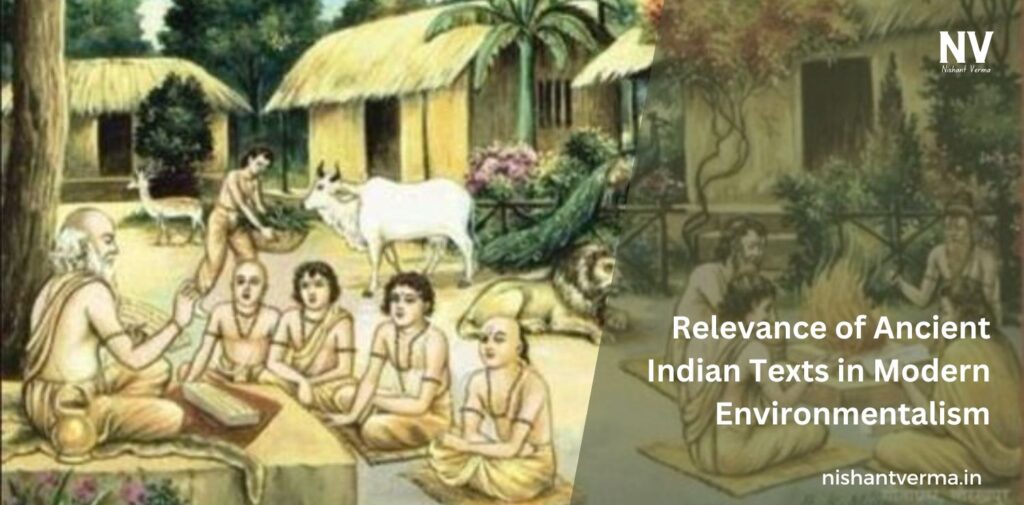As our planet grapples with severe environmental challenges, many are looking toward ancient wisdom for guidance. Ancient Indian texts, such as the Vedas, Puranas, and Upanishads, provide profound insights into living in harmony with nature. These texts emphasize the interconnectedness of all living beings and advocate for a respectful relationship with the environment. This article explores how these ancient philosophies can inform and inspire modern environmentalism, highlighting their enduring relevance in today’s sustainability efforts.
Dharma: A Moral Obligation to the Earth
Central to ancient Indian philosophy is the concept of Dharma, which translates to “duty” or “righteousness.” In the context of environmentalism, Dharma encompasses the moral obligation to protect and respect nature. It suggests that every individual has a responsibility to maintain ecological balance. Texts like the Bhagavad Gita teach that our actions should benefit the world around us, framing environmental stewardship not merely as a choice but as a fundamental duty.
By promoting the idea that caring for the environment is a moral imperative, these ancient texts encourage individuals and communities to engage in sustainable practices. This perspective is increasingly relevant as we navigate a world where ecological degradation threatens our future.

Reverence for Nature: A Sacred Relationship
Another significant aspect of ancient Indian thought is the veneration of natural elements. Rivers, mountains, trees, and animals are often personified as deities. For example, the Ganga is revered not just as a river but as a goddess, symbolizing purity and life. This cultural reverence fosters a sense of responsibility toward protecting these elements.
Such attitudes can inspire modern conservation efforts. When communities regard natural resources as sacred, they are more likely to participate in initiatives aimed at their preservation. This perspective can be pivotal in creating movements that safeguard biodiversity, as people rally around the idea of protecting their “sacred” landscapes.
The Importance of Balance in Nature
Ancient Indian philosophy emphasizes the delicate balance between humans and nature. Texts caution against the excessive exploitation of resources, warning that such actions disrupt this equilibrium. The Upanishads articulate the idea that all living beings are interconnected, forming a web of life where each species plays a vital role in maintaining ecological balance.
This understanding is crucial in today’s context. Overconsumption and pollution threaten the health of our planet, and ancient wisdom serves as a reminder of the consequences of neglecting this balance. By adopting a mindset that values moderation and respect for nature, we can foster sustainable practices that honor the earth’s limits.

Ecological Wisdom: A Rich Understanding of Nature
Ancient Indian texts are filled with detailed observations of flora and fauna, showcasing a profound understanding of the natural world. These texts include references to various plants and animals, discussing their medicinal properties and ecological roles. This ecological knowledge is invaluable today as we face biodiversity loss and seek to conserve endangered species.
For example, traditional practices rooted in ancient texts often promote sustainable land management techniques, such as crop rotation and organic farming. By revisiting these age-old methods, we can integrate timeless wisdom into contemporary agricultural strategies, ensuring food security and ecological health.
Sustainable Practices for Modern Challenges
Many ancient Indian texts advocate for sustainable practices that remain relevant to modern environmental issues. For instance, the significance of water conservation is emphasized in various scriptures. The concept of “Jal Shakti,” or the power of water, is seen as essential for life. Ancient texts recommend techniques for rainwater harvesting and responsible irrigation, which are critical in today’s world of water scarcity.
Moreover, the practice of responsible forestry is rooted in ancient texts that advocate for sustainable resource use. This principle is increasingly vital as deforestation and habitat destruction pose threats to global ecosystems. Learning from these teachings can help us adopt practices that respect and protect our forests.

Key Concepts for a Sustainable Future
Several concepts from ancient Indian philosophy resonate strongly with contemporary environmental challenges:
- Vasudhaiva Kutumbakam: This phrase translates to “the whole world is one family.” It signifies the interconnectedness of all living beings, emphasizing that our actions impact the entire planet. This holistic view is essential for addressing global issues like climate change, where collective action is necessary for meaningful progress.
- Ahimsa: The principle of Ahimsa, or non-violence, extends beyond interpersonal relationships to encompass non-violence toward the environment. This principle encourages a lifestyle that minimizes harm to all living beings. Embracing Ahimsa in environmentalism means promoting practices that protect rather than harm our planet.
- Prana: The concept of Prana refers to the life force present in all living beings. This idea emphasizes respect for all forms of life, asserting that every organism has a role in the ecosystem. Acknowledging the intrinsic value of all life can lead to more compassionate and sustainable practices.
Guiding Modern Environmentalism
- Raising Awareness: Ancient Indian texts can play a crucial role in raising awareness about environmental issues. By highlighting the historical and cultural significance of environmental protection, these texts encourage a deeper understanding of sustainability. Educational initiatives that incorporate ancient wisdom can inspire a new generation of environmental advocates.
- Community-Based Conservation: Traditional practices such as sacred groves, areas preserved due to their spiritual significance, can inspire modern community-led conservation initiatives. These practices foster a sense of belonging and responsibility toward the environment, empowering communities to take action to protect their natural heritage.
- A Holistic Approach: The emphasis on interconnectedness in ancient Indian philosophy encourages a holistic approach to environmental issues. This perspective recognizes that social, economic, and ecological factors are intertwined. By addressing these aspects together, we can develop comprehensive strategies that promote sustainability and community well-being.
Conclusion: Ancient Indian Texts
Ancient Indian texts offer a wealth of wisdom that is immensely relevant to modern environmentalism. Their teachings on Dharma, the veneration of nature, balance, and sustainable practices provide invaluable insights into how we can coexist harmoniously with our planet. By integrating these principles into our contemporary understanding of environmental challenges, we can work toward a more sustainable and equitable future.
As we confront pressing issues such as climate change, pollution, and biodiversity loss, revisiting the teachings of our ancestors can inspire meaningful action. Ancient Indian wisdom not only reminds us of our duty to protect the environment but also empowers us to cultivate a more harmonious relationship with nature. By embracing these lessons, we can foster a culture of sustainability that honors both our heritage and the Earth, paving the way for generations to come.




